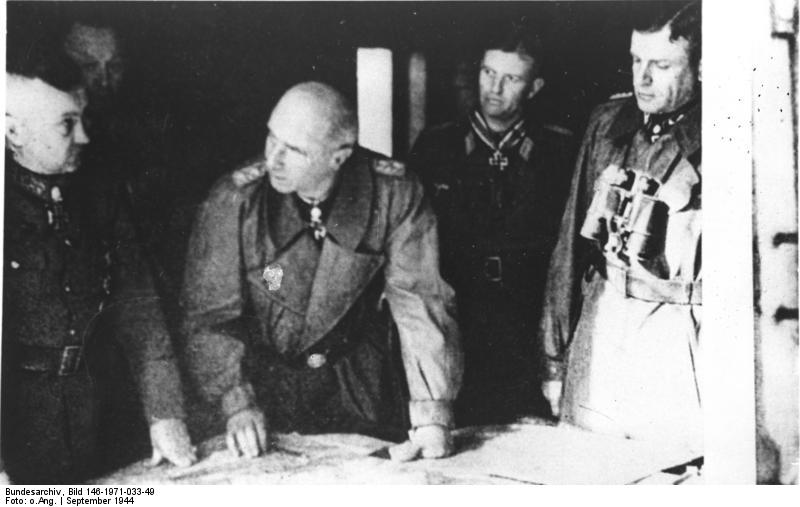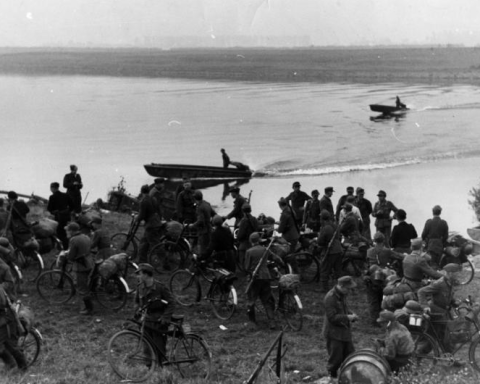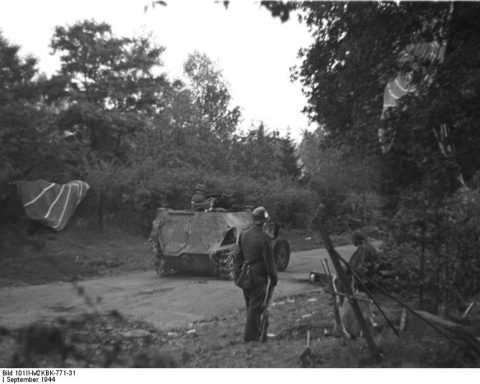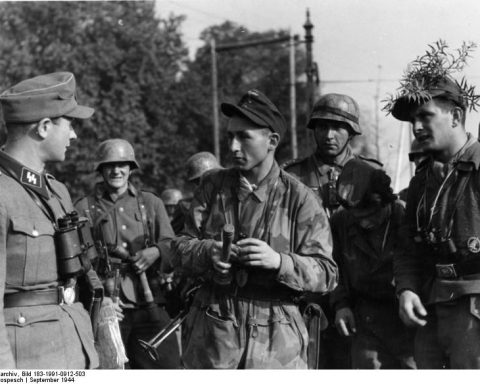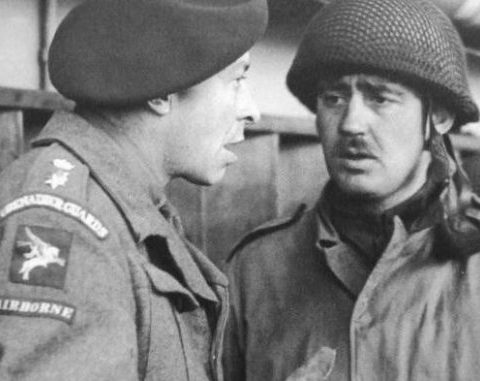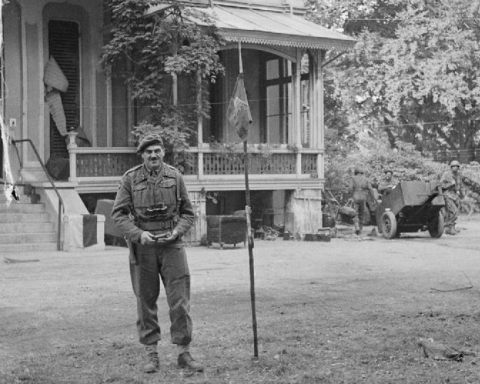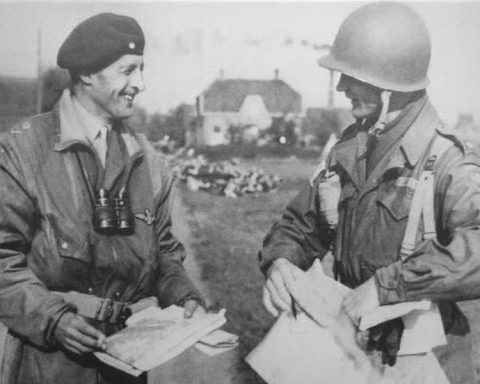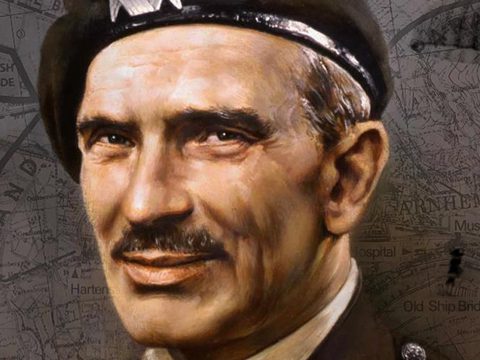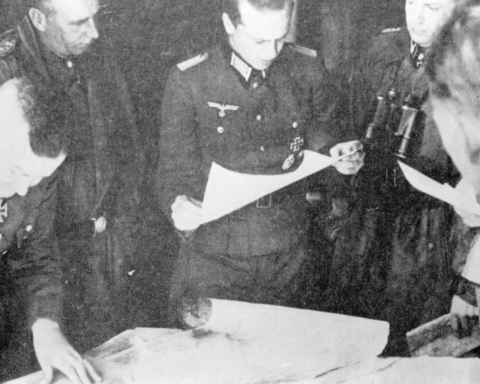SS General Wilhelm Bittrich, Willi for friends, was the general who led the 9th and 10th SS Armored Division who were stationed in the Arnhem region when Operation Market Garden started.
In his role of commander of the 2nd SS Armored Corps, which included the 9th and 10th Armored Divisions, Bittrich was the first German commander in the afternoon of Sunday, September 17, to conclude that the Allied airborne landings were intended to conquer the bridges in the Netherlands.
Bittrich placed the strong point of the German defense on Nijmegen, where the 10th Armored Division ‘Fundsberg’ had to deal with the American airborne troops of the 82nd ‘All American’ Airborne Division. The 9th Armored Division ‘Hohenstaufen’, which was lighter armed, would deal with the British at Arnhem.
It is partly due to Bittrich’s rapid intervention that Operation Market Garden failed. Bittrich was also the one who urged Field Marshal Walter Model to blow up the Waal Bridge near Nijmegen.
Model stopped that. He wanted to use the Waal Bridge for a counter-attack on the Allies south of Nijmegen. According to Bittrich, that was not realistic. At an early stage in Operation Market Garden, Bittrich foresaw that the Americans, with the support of British ground forces, would succeed in conquering the Waal Bridge.
Military career
Wilhelm Bittrich joined Adolf Hitler’s NSDAP early on. In early 1932 he joined the party and from July 1932 he joined the SS. From February 1943 Bittrich was in command of the 9th SS Armored Division Hohenstaufen. After the D-Day landings in Normandy, this division fought to halt the Allied advance. From July 1, 1944, Bittrich was given command of the 2nd SS Armored Corps.
In the outbreak of Normandy by the Allies, the armored divisions of Bittrich suffered severe blows at Falaise. Almost all tanks and heavy weapons were destroyed by the Allies. Because of lack of fuel a lot of undamaged tanks had to be left behind.
At the beginning of September, after having fought at the front almost continuously for more than three months, the II SS Armored Corps of Bittrich was withdrawn. North of the Rhine, far from the fighting, the divisions could catch their breath and be re-equipped.
Bittrich fought with his armored divisions after the Battle of Arnhem during the Battle of the Bulge. In the spring of 1945, he was charged with the defense of Vienna. Bittrich avoided a confrontation with the Russians and withdrew his divisions to the west, surrendering to the Americans in early May 1945.
As a prisoner of war, Bittrich was transferred to France after the war, where he was charged with committing war crimes. Prior to his trial, the Dutch amateur historian Theodoor Boeree corresponded with Bittrich. After the war, Boeree was the first to reconstruct the events in Arnhem in September 1944. The information he received from Bittrich was invaluable.
Boeree translated much of the information he received from Bittrich into English and forwarded it to British generals and commanders, such as Field Marshal Montgomery, General Urquhart, Colonel Frost, and others. Through copies that the British commanders gave to historians, much of Bittrich’s information has been used in British and American books about the Battle of Arnhem.
In his correspondence with Boeree, Bittrich repeatedly emphasized that the Germans had fought “hard but chivalrous” at Arnhem. For example, Bittrich reported that he immediately accepted a request from a British doctor to organize a ceasefire in Oosterbeek to remove injured people, although he should have formally asked permission from above.
Colonel Frost confirmed in a letter to Theodoor Boeree that he fully recognized Bittrich’s picture of the German deployment. Frost even went so far as to ask Boeree to pass this on to Bittrich.
War crimes
The picture of the ‘chivalrous’ German deployment at Arnhem is reflected in more German reports, but for Bittrich it was a spearhead in his reporting. No doubt that this had to do with the fact that Bittrich was in a French prison at the time because he was suspected of war crimes.
In 1953, after eight years in prison, Bittrich was acquitted of war crimes by a French court. Bittrich was accused of ordering the execution of 17 residents of Nimes in France. During the trial, it emerged that Bittrich had never issued such an order.
Bittrich had even taken disciplinary action against the soldiers who carried out the execution.
To avoid losing face, Bittrich was sentenced by the French to 5 years’ imprisonment for not investigating other war crimes committed by soldiers from his divisions, but of which Bittrich did not know anything.
After eight years in prison and a three-year surplus, Bittrich was released the same day. Bittrich was in poor health and withdrew to a small village in the Federal Republic of Germany. Bittrich was approached by Cornelis Ryan in the 1970s for his book ‘A Bridge too Far’, after Ryan came across Boeree’s copies of Bittrich letters.
Bittrich died a few years later in 1979 at the age of 83.

